Nothing But a Man Blu-ray Movie
HomeNothing But a Man Blu-ray Movie 
Criterion | 1964 | 92 min | Not rated | Feb 20, 2024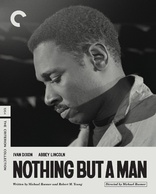
Movie rating
7.7 | / 10 |
Blu-ray rating
| Users | 0.0 | |
| Reviewer | 4.5 | |
| Overall | 4.5 |
Overview
Nothing But a Man (1964)
The film tells the story of Duff Anderson, an African-American railroad worker in the early 1960s who tries to maintain his respect in a racist small town near Birmingham, Alabama, after he marries the local preacher's daughter. In addition to dealing with oppression and discrimination, Anderson must also come to terms with his troubled relationship with his own father, a drunk who abandoned and rejected him.
Starring: Ivan Dixon, Abbey Lincoln, Julius Harris, Gloria Foster, Stanley GreeneDirector: Michael Roemer
| Drama | 100% |
Specifications
Video
Video codec: MPEG-4 AVC
Video resolution: 1080p
Aspect ratio: 1.37:1
Original aspect ratio: 1.37:1
Audio
English: LPCM Mono (48kHz, 24-bit)
Subtitles
English SDH
Discs
Blu-ray Disc
Single disc (1 BD)
Playback
Region A (locked)
Review
Rating summary
| Movie | 4.5 | |
| Video | 3.5 | |
| Audio | 3.0 | |
| Extras | 4.0 | |
| Overall | 4.5 |
Nothing But a Man Blu-ray Movie Review
Reviewed by Justin Dekker December 2, 2024As relevant and powerful as it was at the time of its original release in 1964, Michael Roemer and Robert M. Young's 'Nothing but a Man' arrives
on
Blu-ray courtesy of The Criterion Collection. Released at the height of the Civil Rights Movement and starring Ivan Dixon, jazz legend Abbey Lincoln,
Julius Harris, and Yaphet Kotto in his first film role, 'Nothing but a Man' follows Duff Anderson (Dixon) as he faces racism's personal, social, and
economic
impacts as he searches for love and a sense of self-worth. The black-and-white film and its soundtrack have been restored and approved by the
director Michael Roemer with solid results. The included supplemental material primarily focuses on Young and Roemer and their experiences
prior to and through the release of the film, and also includes an all-too-short (13-minute) interview with three of the actors. A booklet with an
essay from film critic and jazz reviewer Gene Seymour is also included.
For a variety of reasons, though set in the then-present-day Jim Crow South, Nothing but a Man was shot in the North, instead of Alabama
where the film is set. Duff Anderson (Ivan Dixon) has a largely carefree life. He's young, single, and floats through life going from to job, wherever
that may take him. It's not until one night when he meets Josie (Abbey Lincoln), the local preacher's daughter, that he begins to wish for a life that
has eluded him - a life with a home, a wife, and a family. While Josie's father isn't supportive of the idea, Josie exerts her independence, and the
two are soon wed. Initially, the couple is happy. But as time passes, Duff rankles at the racist attitudes and treatment the couple are victims of on a
daily basis. As Duff tries to stand up for himself, he's met with consistently worse treatment and loses job after job. As the economic and social
realities of racism begin to mount, Duff's self-esteem suffers to the point where even Josie is unable to help him. As familial and personal pressures
mount, he sets out to find his own father (Julius Harris), who has been largely absent from his life. It's a reunion that will have a substantive
impact on Duff, Josie, and their future.
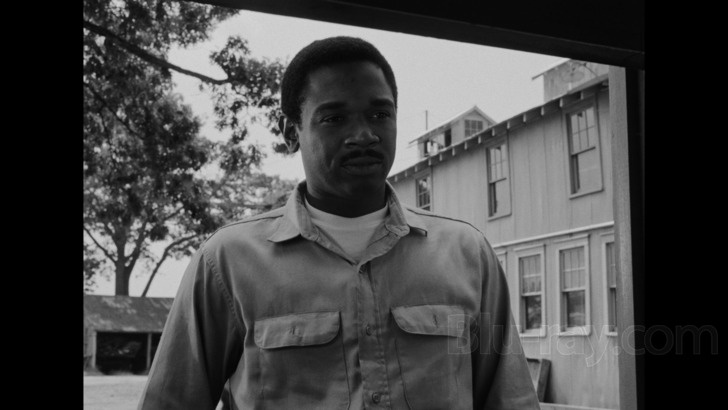
By the time Michael Roemer and Robert M. Young made Nothing But a Man in 1964, the pair had already worked together on a particularly bleak documentary of life in an Italian slum. Though Cortile Cascino was commissioned by NBC, the film was shelved before it could ever be broadcast, and it's something of a miracle that a print of the 1962 documentary exists at all. Prior to that ill-fated project, Robert M. Young had turned the focus of his camera on the Civil Rights Movement in his 1960 documentary Sit-In, which focused on the efforts of African American college students to desegregate the lunch counters of Nashville, TN. It's this documentary approach and sensibility that lends so much power to Nothing but a Man. Shooting the film in black-and-white, the film maintains a gritty and realistic feel. Without a complete color palette to potentially draw the viewer's attention or distract from the cast, the viewer is much more able to simply focus on the performances and the struggle and emotion being conveyed. The documentary style also enables Young to capture shots in scenes that feel real, generating the sense that the viewer is simply an invisible witness to the events in these people's lives rather than detecting and dissecting elaborate or carefully constructed shots. The blatant and aggressive racism on display permeates nearly every moment of Duff and Josie's courtship and marriage, posing a very real threat and generating fear that invades even their quietest, most intimate moments. The end result is a viscerally powerful film that feels claustrophobic and bottled up, with the realities of the Jim Crow South and the inherent pressures and racism constantly about to boil over and explode. The frequent close-ups amplify this sensation, with the raw, emotional performances from Dixon, Lincoln, and Harris becoming inescapable and unavoidable, leaving the viewer no choice but to confront the very human impact of these conditions on these people's past, their current daily life, and any plans or hopes they may have for the future. At times, Duff seems unable to cope with the reality of his situation, feeling emasculated by his inability to find or maintain a decent, albeit not quite meaningful job, and thereby provide for his wife and family. It's obvious that in his estimation this is the primary measure of a man. Failure to do so threatens to send him down the same path as his own father, unemployed and unemployable, escaping into a bottle, unable to truly connect with the few people who care about him, and largely a stranger to his own son. Josie, through it all, despite the harsh treatment she receives, remains the bedrock of the relationship, unwilling to run from the problems facing them, and focused on crafting a meaningful life together, whatever that looks like.
The primary cast of Nothing but a Man, despite many being relative newcomers to the big screen, is excellent. For several, this was just the first step in rich careers that featured roles in landmark films and television series. OF the principals, all would go on to become instantly recognizable. Ivan Dixon's Duff Anderson is instantly relatable, and just a year after this film he would go on to inhabit the role for which he is best known, that of Sgt. James Kinchloe in television's Hogan's Heroes. Abbey Lincoln had already become a well known civil rights activist and had gained success as a jazz singer starting with her 1956 debut album, Abbey Lincoln's Affair... A Story of a Girl in Love before she came to the film. And while she would go on to co-star with Sidney Poitier and Beau Bridges in For Love of Ivy (1968), music remained her primary focus. Not simply new to the screen but new to acting, Julius Harris was just over forty years of age when he appeared in Nothing but a Man, his first acting role. After appearing in Roemer's The Plot Against Harry (1971), he would go on to appear in Blaxploitation classics like Shaft's Big Score!, Super Fly, Trouble Man, Black Caesar, Hell Up in Harlem, and a personal favorite of mine, Pam Grier's 1975 film Friday Foster. Harris's reach also extended into more mainstream films such as the James Bond film Live and Let Die and the original The Taking of Pelham One Two Three (1974) before largely transitioning to television roles in the 1980s and 90s. Also making his big screen debut, Yaphet Koto appears here in a small role as Jocko, before going on to such films as Alien, Othello, and Friday Foster. Robert M. Young's would go on to direct the dark and disturbing prison drama Short Eyes (1977) based on a play by Miguel Piñero, while Michael Roemer's output includes the gangster comedy The Plot Against Harry and the television drama Vengeance is Mine.
Nothing But a Man Blu-ray Movie, Video Quality 
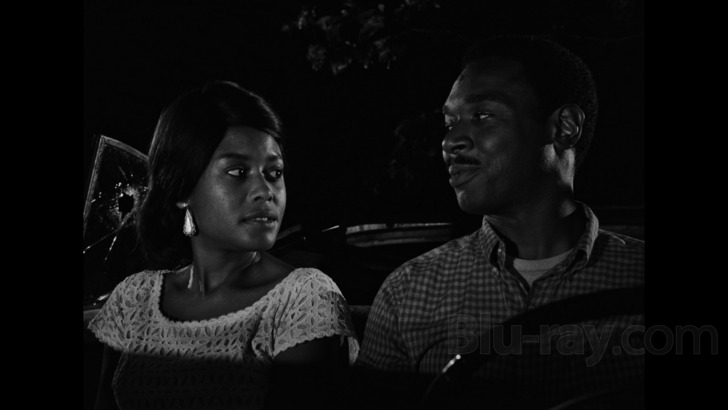
Per the notes in the enclosed booklet, the film is presented in its original aspect ratio (1:37:1) from a new digital master created from the original camera negative and restored in 4K. The work done was approved by Director Michael Roemer. Nothing but a Man's transfer maintains a healthy fine-grain structure that resolves naturally and gives the feature a pleasant filmic feel. While facial and hair particulars are often nicely detailed, and some environments present with a fair amount of detail, overall the film can often appear a bit soft at times. However, this is hardly a substantial issue and feels appropriate for a smaller film of its age. Whites can be quite brilliant, such as on the reverend's collar and on the lacey trim of women's dresses, and blacks are consistently inky and absorbing. Crush, as a result, can be issue. However, the image is stable and it is free from debris or damage.
Nothing But a Man Blu-ray Movie, Audio Quality 
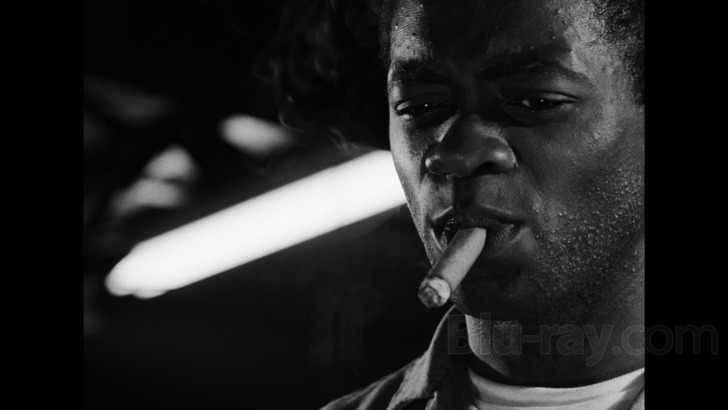
The notes in the enclosed booklet indicate that the mono mix presented here was remastered from the 35mm original soundtrack negative. It's a solid enough track, but there are certain inherent insufficiencies, such as the obvious lack of bass to add depth and power to the jackhammers that populate the film's opening scene and other areas as well. This, however, is typical for a film of its age. Effects aside, dialogue is handled well and is front and center focused. The film's soundtrack includes an impressive assortment of artists of the day including Martha and the Vandellas (Heatwave), The Miracles, (Little) Stevie Wonder, and The Marvelettes, and from time to time the music is pushed to the forefront. But even in those moments, dialogue is always properly prioritized. Ambient sound effects such as crickets add texture to nighttime scenes. I did not detect any sibilance issues or other defects or anomalies. It's a very suitable companion for the film. English subtitles for the deaf and hard of hearing are also available.
Nothing But a Man Blu-ray Movie, Special Features and Extras 
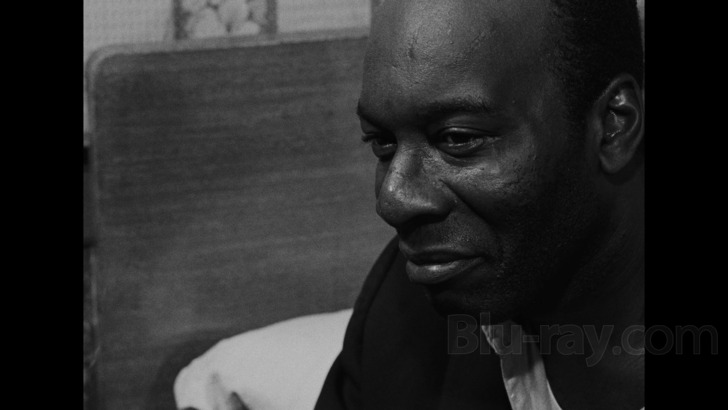
- An Introduction To Michael Roemer (25.43) - Produced by the Criterion Collection in 2024, Roemer leads the viewer on a journey that starts with his childhood in pre-war Germany, before eventually arriving in the US at 17 in 1945. He met Robert Young, and while both had a love of film, they ended up taking different paths, only to be reunited in 1962 when they went to work on a project in Italy, Cortile Cascino, the first of four films the pair would make together. After Young had made a film called Sit-In in 1960, he took Roemer to the south to do research for another collaboration, Nothing but a Man. Roemer discusses his difficulty finding the story for the film, focusing on his own family's plight as German Jews in the years leading up to WW II as inspiration for the film. He shares memories from the production and also stories of the cast - particularly Ivan, Abbey Lincoln, Gloria Foster, and Julian Harris. He discusses his own feelings about the film, particularly the ending, before moving on to discuss his other work.
- Michael Roemer and Robert M. Young (22.53) - While the conversation between Michael Roemer and Robert Young resented here was originally recorded in 2004, the Criterion Collection crafted this edit of the pair discussing their friendship and their time working on Nothing but a Man in 2024. without the assistance of the moderator, the pair have a free-wheeling and wide-ranging discussion that begins with their first project together and transitions quickly to Nothing but a Man. They cover their journey from South Carolina to New Orleans, including a brief encounter with Martin Luther King, Sr., at the Black Leadership Conference in Atlanta. The pair also recall the racism they witnessed and experienced during their time working on the film. When the conversation turns to casting, they share that after Sidney Poitier turned them down,the cast fell together very quickly. Young and Roemer discuss their collaborative process, learning on the fly, fundraising, and finishing the final weeks of shooting without a proper crew because the money had run out. The pair share an apparent love for the project, the impact the film had on them, and the impact it had on audiences when it was screened. It's an enjoyable and informative segment.
- Meet the Actors> (13.20) - Recorded in 2004 and edited in 2024, this segment features interviews, conducted by Michael Roemer and Robert M. Young, with stars Ivan Dixon, Abbey Lincoln, and Julius Harris. Sadly, while all three have passed away in the intervening years, the conversations captured here, while all very different, are intensely interesting and moving as they recount lives, their experiences working on the film, and it's impact. While I appreciate the content that is here, this is one instance where the piece was over far too soon.
- Booklet - The enclosed booklet features a six-page essay entitled, "What We Can See in Ourselves". written by film critic and jazz reviewer Gene Seymour. In the piece, he discusses the film, Young and Roemer, and brief biographical sketches of leads Dixon and Lincoln, before closing with comments about the film's revival in 1993 at festivals in London and New York.
Nothing But a Man Blu-ray Movie, Overall Score and Recommendation 
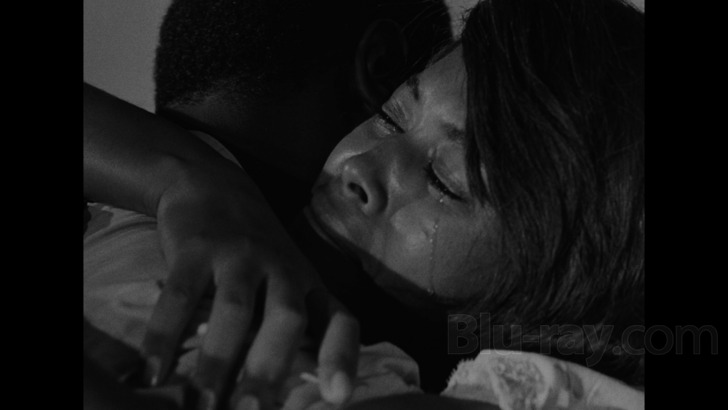
Nothing but a Man never flinches or allows the camera to look away from the ever-present and insidious racism Duff and Josie face in their daily lives. Despite the passage of sixty years, the film remains as topical as it was at the time of its initial release in 1964. Never feeling like a time capsule, it's an unvarnished, unembellished, and all too human story bearing witness to a past that is still too much with us. The film has lost none of its impact. That power and endurance are due in large part to Robert M. Young's cinematography and the incredible performances of Dixon, Lincoln, and Harris. Technical merits are strong and Criterion's Nothing but a Man is very highly recommended.
Similar titles
Similar titles you might also like

Under the Volcano
1984

The Servant
1963

Not Wanted
1949

The Informer
1929

The Manxman
1929

Love on the Dole
1941

Requiem for a Village
1975

Hamlet
1948

The Young Pope
2016-2017

Bergman Island
2021

Clouds of Sils Maria
2014

Tommaso
2019

Alice Guy Blaché Vol. 2: The Solax Years
1911-1914

Small Axe
includes "Uprising" (2021)
2020

My Dinner with André
1981

Poison
1991

Heaven Knows What
2014

Way Down East
1920

Elysia: Valley of the Nude
1933

To Sleep with Anger
1990